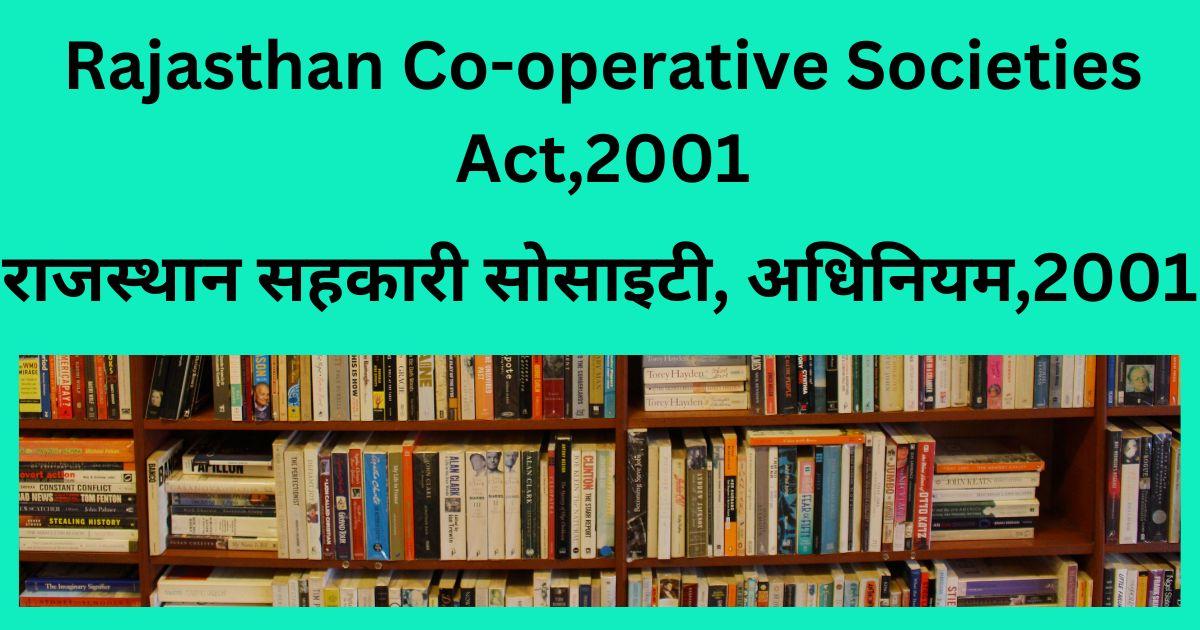The Rajasthan Co-operative Societies Act 2001 is a comprehensive legislation that governs the functioning of cooperatives in the state of Rajasthan, India. The act provides for the formation, registration, management, and dissolution of cooperatives in various sectors, including agriculture, dairy, credit, housing, and consumer goods.
The act aims to promote the cooperative movement in the state, which has been instrumental in empowering the rural and urban poor, promoting self-help and mutual aid, and generating employment and income opportunities.

Contents
Key Provisions of the Rajasthan Co-operative Societies Act 2001:
The act defines a cooperative as an association of persons who have voluntarily joined together to achieve a common economic or social objective, through the formation of a democratically controlled enterprise. The act provides for the following key provisions:
- Registration of cooperatives: The act provides for the registration of cooperatives with the Registrar of Cooperative Societies, who is appointed by the state government. The registration process requires the submission of an application, along with the necessary documents and fees, and the approval of the registrar. Once registered, a cooperative becomes a separate legal entity, with its own rights and obligations.
- Membership: The act provides for the eligibility criteria for membership of a cooperative, which includes residence or occupation in the area of operation of the cooperative, and payment of the prescribed share capital. The act also provides for the rights and obligations of members, including the right to participate in the management of the cooperative, and the obligation to comply with the bylaws and rules of the cooperative.
- Management: The act provides for the management of the cooperative by a board of directors, which is elected by the members. The board of directors is responsible for the overall management and direction of the cooperative, and is accountable to the members. The act also provides for the appointment of a chief executive officer, who is responsible for the day-to-day management of the cooperative.
- Financial management: The act provides for the financial management of the cooperative, which includes the maintenance of proper books of accounts, the preparation of annual accounts and audit reports, and the submission of these reports to the registrar. The act also provides for the distribution of profits, which is done in proportion to the share capital held by the members.
- Dispute resolution: The act provides for the resolution of disputes between members, between members and the cooperative, and between cooperatives, through a conciliation process. If the conciliation process fails, the dispute may be referred to the cooperative court, which is a specialized court established under the act.
- Liquidation: The act provides for the dissolution of a cooperative in case of insolvency or other reasons, through a process of liquidation. The assets of the cooperative are distributed among the members, after the payment of liabilities.
Impact of the Rajasthan Co-operative Societies Act 2001:
The Rajasthan Cooperative Act, 2001 has had a significant impact on the cooperative movement in the state. Some of the key impacts are:
- Promotion of cooperatives: The act has provided a legal framework for the promotion and development of cooperatives in various sectors. This has resulted in the formation of a large number of cooperatives in the state, which have contributed to the socio-economic development of the state.
- Empowerment of rural and urban poor: The cooperatives have been instrumental in empowering the rural and urban poor, by providing them with access to credit, markets, and technology. This has resulted in the creation of employment and income opportunities, and the reduction of poverty and inequality.
- Promotion of self-help and mutual aid: The cooperatives have promoted self-help and mutual aid among the members, by providing them with a platform to pool their resources and skills, and to work together for their common economic and social interests.
- Development of infrastructure: The cooperatives have also contributed to the development of infrastructure in the state, particularly in rural areas. For example, agricultural cooperatives have provided farmers with access to irrigation, seeds, fertilizers, and other inputs, while housing cooperatives have provided affordable housing to low-income families.
- Promotion of gender equality: The cooperatives have also promoted gender equality, by providing women with access to credit, markets, and training, and by encouraging their participation in the management of the cooperatives. This has helped to empower women and to reduce gender-based discrimination and inequality.
Challenges and opportunities:
Despite the many benefits of the cooperative movement, there are also challenges and opportunities that need to be addressed. Some of the key challenges are:
- Weak governance: Many cooperatives suffer from weak governance, due to factors such as lack of transparency, accountability, and democratic participation. This can lead to mismanagement, corruption, and inefficiency.
- Lack of capital: Many cooperatives also face a lack of capital, which can limit their ability to expand their activities, invest in new technologies, and compete in the market.
- Limited outreach: Many cooperatives also have limited outreach, particularly in rural areas, where access to markets, credit, and technology is often limited.
- Legal and regulatory barriers: The cooperatives also face legal and regulatory barriers, such as complex registration procedures, restrictive bylaws, and outdated laws, which can limit their ability to operate effectively and efficiently.
To address these challenges, there are several opportunities that can be explored:
- Capacity building: Capacity building initiatives can help to strengthen the governance, management, and technical skills of cooperative members and staff. This can include training programs, workshops, and mentoring.
- Financial support: Financial support can be provided to cooperatives, in the form of loans, grants, and subsidies, to help them to expand their activities, invest in new technologies, and compete in the market.
- Outreach programs: Outreach programs can be developed to help cooperatives to reach out to new members and markets, particularly in rural areas. This can include awareness campaigns, marketing initiatives, and mobile-based services.
- Legal and regulatory reforms: Legal and regulatory reforms can be undertaken to simplify the registration process, promote democratic participation, and facilitate the operation of cooperatives. This can include the revision of laws and regulations, the establishment of specialized courts, and the promotion of self-regulation.
Read Also – Rajasthan Co-operative Societies Rule, 2003 Download Pdf
Conclusion:
The Rajasthan Cooperative Act, 2001 is a comprehensive legislation that has played a critical role in promoting the cooperative movement in the state. The act has provided a legal framework for the formation, registration, management, and dissolution of cooperatives, and has contributed to the empowerment of the rural and urban poor, the promotion of self-help and mutual aid, and the development of infrastructure. However, there are also challenges that need to be addressed, such as weak governance, lack of capital, limited outreach, and legal and regulatory barriers.
To overcome these challenges, there are several opportunities that can be explored, such as capacity building, financial support, outreach programs, and legal and regulatory reforms. By addressing these challenges and opportunities, the cooperative movement in Rajasthan can continue to grow and thrive, and contribute to the socio-economic development of the state.
Rajasthan Co-operative Societies Act 2001 Download pdf Here

What a fantastic resource! The articles are meticulously crafted, offering a perfect balance of depth and accessibility. I always walk away having gained new understanding. My sincere appreciation to the team behind this outstanding website.